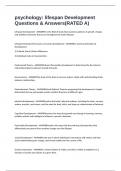Exam (elaborations)
psychology: lifespan Development Questions & Answers(RATED A)
- Course
- Institution
Lifespan Development - ANSWERIt is the field of study that examines patterns of growth, change, and stability in behavior that occur throughout the entire lifespan. Lifespan Development focuses on human development - ANSWER1) universal principles of development 2) Cultural, Racial, Ethnic diffe...
[Show more]



